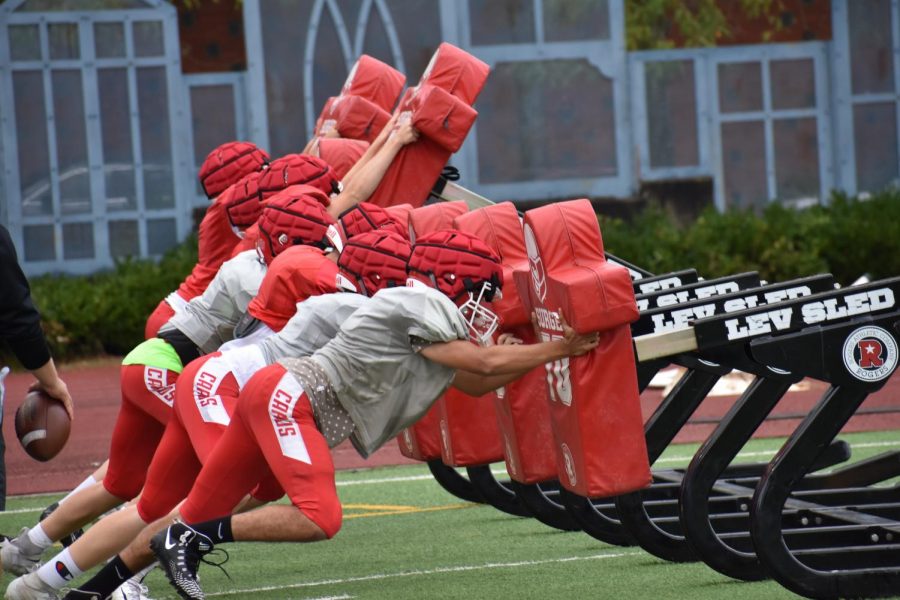As national football enrollment declines, Lincoln defies odds
The JV football team prepares to tackle a seven-man sled. Lincoln’s football practices correct tackling and wears Guardian helmet covers for concussion prevention.
Despite national trends of diminishing high school football enrollment, the Lincoln football team has experienced growth in recent years.
In the past 10 years, enrollment in high school football has declined by 6.6 percent nationally, according to data from the National Federation of State High School Associations.
In Oregon, 23 percent fewer kids are playing high school football, according to data from the Oregon School Activities Association.
At Lincoln, during the 2018-2019 season, approximately 40 people registered and played for the football team. This year, the team already has over 50 people registered to play.
Across the country, injury concerns have led high schoolers to drop the sport. Lincoln too has had parents concerned about concussions or injuries that can occur in football.
Despite this, the team has not experienced a decrease in enrollment. This is, in part, because of the focus that head coach Jeremy Johnson has placed on safety.
“We do a lot of things to protect our kids, from the way we practice, [to] the way we coach. Those two things right there are so much different than they were five years ago or ten years ago, and that’s all around preparing the kids the right way to protect their bodies. So, things have shifted and it’s pretty awesome to see all that we’ve done,” Johnson says.
According to Johnson, players are now taught the correct way to tackle. The “shoulder tackle,” where players aim for the shoulder of their opponents, is supported over the “rugby tackle.” A “shoulder tackle” limits the number of head-on collisions that could lead to a concussion.
In addition to the increased focus on safety of Lincoln’s football team, the supportive community has kept students wanting to enroll. Parents, students, and the community have created what Johnson believes to be one of the strongest football communities in the state.
However, he does not believe that there are enough programs like Lincoln’s.
“There needs to be more programs [like Lincoln] that are willing to talk about all of the things we’ve done and are doing as a sport to change the way we coach it, the way we teach it, and let people know that our players are well prepared, differently than what some of the media reports around the way kids were coached twenty or thirty years ago,” Johnson says.
Football becomes a huge part of these students’ life. Football is a place where high schoolers learn valuable life lessons that can be applied both on and off the field. Johnson says that students learn the importance of camaraderie, integrity, optimism and persistence.
“Football is important to me because of the experiences you gain representing your school, the friendships you gain with your teammates, and the life skills you gain like leadership, perseverance, and grit,” says sophomore Abraham Barrow, who plays as a swing between JV and varsity.
Although statistics show an uncertain future for high school football, things are looking up for Lincoln’s team. More students are participating, and more parents are asking questions about how to get their children signed up.
“I think every coach would love to say ‘our numbers are growing,’” Johnson says. “I can say our numbers are growing, so that’s a good thing.”

